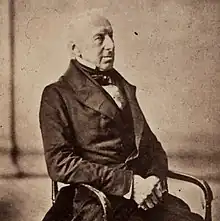Sir Charles Monck, 6th Baronet
Sir Charles Miles Lambert Monck, 6th Baronet (7 April 1779 – 20 July 1867) was an English politician. He succeeded to the Baronetcy of Belsay Castle on the death of his father in 1795.
Sir Charles Monck, 6th Baronet M.P. | |
|---|---|
 Sir Charles Monck, 6th Baronet, 1865 photograph | |
| Born | 1779 |
| Died | 1867 |
| Occupation | politician |
| Title | baronet |
| Parent |
|
Life
He was born with the surname Middleton, as the third son of Sir William Middleton, 5th Baronet and his wife Jane Monck.[1][2] He took the surname of his maternal grandfather Laurence Monck of Caenby Hall, Caenby, Lincolnshire who died in 1798, in order to inherit his estate. He was educated at Rugby School and by private tutors at Caenby.[3]
He served as High Sheriff of Northumberland in 1801 and was Member of Parliament for Northumberland 1812–1820, sitting as an independent politician.
Monck was an avid Hellenist and in 1817, with the assistance of architect John Dobson, he completed the building of an impressive new mansion house in Greek Revival style, Belsay Hall, adjacent to Belsay Castle in Northumberland, inspired by his buildings seen in his lengthy honeymoon in Greece. Belsay Castle is a Grade 1 listed building which has been in the custody of English Heritage since c.1980.[4]
Family
Monck married twice, firstly, in 1804 to Louisa Lucia Cook (died 1824), daughter of Sir George Cooke, 7th Baronet. They had two sons and four daughters.[1]
- Charles Atticus Monck, elder son (1805–1856), was born in Athens. He married in 1835 Laura Ridley, second daughter of Sir Matthew White Ridley, 3rd Baronet.[5] Their son Arthur succeeded as 7th Baronet.
- William Monck, younger son.[6]
- Julia, married as his first wife Sir Edward Blackett, 6th Baronet.[7]
- Louisa Maria, died 1821.[8]
He married secondly, in 1831, Mary Elizabeth Bennett.[3]
References
- "Monck, Sir Charles Miles Lambert, 6th Bt. (1779-1867), of Belsay Castle, Northumb. History of Parliament Online". www.historyofparliamentonline.org.
- "Middleton, Sir William, 5th Bt. (1738-95), of Belsay Castle, Northumb. History of Parliament Online". www.historyofparliamentonline.org.
- Kilburn, Matthew (2008). "Monck [formerly Middleton], Sir Charles Miles Lambert, sixth baronet (1779–1867), architect, landscape designer, and politician". Oxford Dictionary of National Biography (online ed.). Oxford University Press. doi:10.1093/ref:odnb/93216. (Subscription or UK public library membership required.)
- Brown, Mark (23 August 2023). "Greek temple-style house rescued from two centuries of Northumberland damp". The Guardian. Retrieved 23 August 2023.
- Edmund, Lodge (1846). The peerage of the British empire as at present existing. To which is added the baronetage. p. 134.
- Temple, Frederick (28 October 2021). Rugby School Register: From 1675 to 1867 Inclusive: With Alphabetical Index. BoD – Books on Demand. p. 86. ISBN 978-3-7525-2288-4.
- The Peerage, Baronetage, Knightage & Companionage of the British Empire. 1890. p. 710.
- The Gentleman's Magazine. E. Cave. 1821. p. 573.